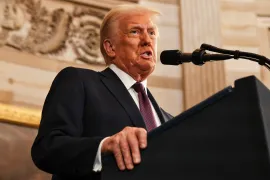Prominent figures, including World Trade Organisation (WTO) Director-General Ngozi Okonjo-Iweala, former Nigerian High Commissioner to Botswana Prof. Alaba Ogunsanwo, and Nigerian Institute of International Affairs (NIIA) Director-General Prof. Eghosa Osaghae, have shared their perspectives on the immigration executive orders signed by U.S. President Donald Trump.
Other notable voices, such as former Federal University, Oye-Ekiti Vice-Chancellor Prof. Kayode Soremekun, former Nigerian Ambassador to France Akin Fayomi, and NIIA Director of Studies Prof. Efem Ubi, also weighed in during interviews with The Nation.
Okonjo-Iweala Urges Calm
Speaking at the 2025 World Economic Forum (WEF) in Davos, Switzerland, Okonjo-Iweala called for calm and patience. She emphasized the need to wait for the actual implementation of the policies before overreacting.
“I’m concerned, but my approach is to keep calm and see what policies are actually enacted and implemented before we get overexcited,” she remarked.
Osaghae: U.S. Laws for U.S. Citizens
Prof. Osaghae highlighted that the executive orders are American laws and do not directly affect Nigerians. He stressed that individuals in the U.S. illegally must face the consequences of their actions.
“These are American issues, not Nigerian concerns,” he stated. “Anyone doing business with the U.S. must adhere to their laws.”
Ogunsanwo: Not Our Concern
Prof. Ogunsanwo described the situation as an internal U.S. matter, emphasizing that executive orders are common tools for American presidents. “This shouldn’t bother us as Nigerians,” he said.
Fayomi: Premature to Judge Trump’s Policies
Akin Fayomi cautioned against premature judgments, stating that legal actions against the policies have already begun. He pointed out that principles like jus soli (right of the soil) are entrenched in the U.S. Constitution, making Trump’s policy a challenging endeavor.
“It is too early to assess these controversial policies,” Fayomi concluded.
Soremekun: Potential Impact on the U.S. Economy
Prof. Soremekun noted that the policy of ending birthright citizenship isn’t entirely new, drawing comparisons to similar moves by the UK. While acknowledging potential economic jolts due to reduced immigrant labor, he added that such policies might encourage better governance in countries like Nigeria.
Ubi: A U.S. Internal Policy
Prof. Efem Ubi called the birthright citizenship policy a purely internal matter, unlikely to significantly impact Nigeria. He highlighted ongoing legal challenges in the U.S. and described the move as undermining the country’s liberal image.
“President Trump’s executive orders portray what we term ‘international hypocrisy,’” Ubi remarked.
The global reactions underscore a range of perspectives on the controversial policies, reflecting their potential international implications and local impacts.







